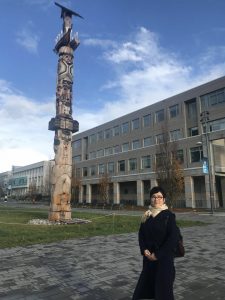The Tianzhu Global Network for the Study of Buddhism and East Asian Cultures at UBC cordially invites you to attend a lecture to be given by our visiting professor, Dr. Yi’nan Zhang 張軼男 of the Beihua University 北華大學, China, on “Du Fu’s 杜甫 (712-770) Poems and Chan Buddhism”.
Click here to read the lecture report written by Xian’ao Shi.
When: 4-6pm, January 18 (Thursday), 2018
Where: Room 604, Asian Centre
Abstract: Confucianism accompanies Du Fu throughout his whole life and even holds an important status in his thoughts; indeed, the model of a Confucian Poet-Sage outlines the principal features of Du Fu. However, firmly believing that Du focuses almost exclusively on Confucianism in his lifetime will make it difficult to explain his achievements in poetry and his broad sense of benevolence. As Scholar Jin Qihua notes: “Such narrow understanding could not even properly judge his poetry achievements nor the era’s influence on him, let alone interpret how Du’s poems reflect his times.” In fact, born in the glorious age of Tang Dynasty, when Sanjiao (三教) reconciled with each other, while Buddhism and Daoism prevailed unprecedentedly, Du Fu, as a knowledgeable and outstanding poet, was inevitably deeply influenced by Daoism, and in particular, Buddhism.
Among Du Fu’s more than 1400 copies of poems, forty-eight of these include abundant Buddhist allusions, terms and ideas, and are definitely related to Buddhism and Chan. These images are mainly derived from Mahayana Buddhism classics like the Lotus Sutra, Vimalakirti Sutra, Diamond Sutra, Surangama Sutra, Paramita Sutra, the Great Nirvana Sutra, etc. This is a sign of how Du Fu is inspired by Buddhist thoughts. Furthermore, in the proposed religious poems above, Du often compares the eminent monks he has ever met with to the historical venerables such as Hui Yuan, Zhi Dun, and Tang Xiu. Meanwhile, Du Fu claims that at his early age he has already “been devoted to The Temple of Double Peaks, and has knocked at the temple Gate for the Seventh Patriarch’s Buddhist Chan”. Examining his early Buddhist related poems, we learn that Du Fu randomly travels to temples at a young age, and begins thinking of Buddhism. In addition, some of his late years’ works written in Sichuan Province express his desire to follow Chan masters like Hui Ke & Zeng Can to practice Mahayana dharma. Others further depict his satisfaction with being a virtuous man and his apprehension of the Prajna Kong Ideology (Emptiness), and manifest his approach to Thoughts of Madhyamika as well. So-called great litterateurs always have a profound background.
 Yi’nan ZHANG is a literary and cultural scholar whose research focuses on the Chinese literature and Chinese writing. She earned her doctorate in Chan Buddhism and Chinese Literature at Jilin University in 2013. Her most recent publications concern the relationship between Chan and Chinese literature. A book on Interpreting Dufu’s Poems According to Chan, which is based on her doctoral dissertation Chan in Dufu’s Poems, was published by China Social Sciences Publishing Press in 2014.
Yi’nan ZHANG is a literary and cultural scholar whose research focuses on the Chinese literature and Chinese writing. She earned her doctorate in Chan Buddhism and Chinese Literature at Jilin University in 2013. Her most recent publications concern the relationship between Chan and Chinese literature. A book on Interpreting Dufu’s Poems According to Chan, which is based on her doctoral dissertation Chan in Dufu’s Poems, was published by China Social Sciences Publishing Press in 2014.
At Beihua University, Jilin Province, China, she is an associate professor of the Department of Liberal Arts since 2008; master degree supervisor; expert of Jilin Province’s Public Institution; member of Council of the Jilin Province’s Writers Association. She gives lectures like Philosophy of Drafting / Literature Methodology / Buddhism and Chan in Chinese Poetry / Principle of Journalism to undergraduates and graduates majoring in Chinese Language & Literature Program; she is also working on Chinese thought and cultural.
Sponsored by China Scholarship Council, she is pursuing study at the Department of Asian Studies, the University of British Columbia, as a visiting scholar (2017-2018).








